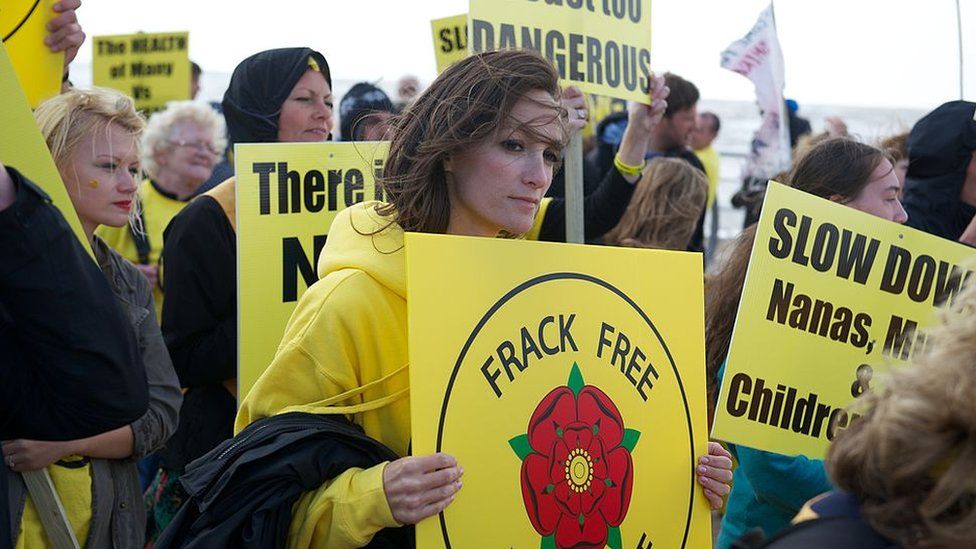ARTICLE AD BOX
 Image source, Getty Images
Image source, Getty Images
Previous fracking applications have attracted protests from activists and locals
The government has lifted the ban on fracking for shale gas in England, alongside unveiling its plans to limit rising energy costs.
The controversial practice was halted in 2019, amid opposition from environmentalists and local concerns over earth tremors.
But new Prime Minister Liz Truss has backed fracking as a way of boosting domestic gas supplies.
She has said it should only go ahead with the support of local communities.
Green groups say fracking will not cut energy prices, and undermine efforts to hit the UK's net zero target.
But pro-fracking Tory MPs, including new business secretary Jacob Rees-Mogg, have argued it will help the UK ween itself off foreign energy.
The Scottish and Welsh governments oppose fracking, and say they will not use their powers to grant drilling licences.
Fracking involves drilling into the earth and directing a high-pressure mixture of water, sand and chemicals at a rock layer in order to release the gas inside.
Ms Truss announced the ban would be reversed as she unveiled a plan to cap energy bills to around £2,500 annually for typical households for two years from October.
The government is expected to borrow at least £100bn to pay for the plans, with estimates set out later this month.
'Sensible thing'
Ms Truss said tapping into the "huge reserves" of shale gas would help the UK meet a new target of being a net energy exporter by 2040.
She has previously argued the UK is too dependent on international energy prices, which have rocketed since Russia's invasion of Ukraine earlier this year.
Earlier, Levelling Up Secretary Simon Clarke told the BBC fracking was the "sensible thing to do" with community consent, and the UK needed "gas from all sources".
"We do need to be pragmatic. With [Russian president Vladimir] Putin weaponizing gas supplies, we need as much in the near term, that we can get," he added.
Image source, Getty Images
Image caption,Shale gas exploration at Little Plumpton in Lancashire in 2018 attracted local protests
The government ordered a review of the science behind fracking in April. Critics have long warned that it can cause earthquakes, water contamination, noise and traffic pollution.
In their 2019 election manifesto, the Conservatives said they would not support it "unless the science shows categorically that it can be done safely".
Some senior Tories, including former Brexit minister Lord Frost, have called on Ms Truss to fast-track fracking by classifying shale gas sites as "nationally significant infrastructure projects".
But the MP Ms Truss has appointed as climate minister, Graham Stuart, has previously said shale gas companies should be forced to seek planning permission at every stage, including exploratory drilling.
"Anything less will make people think that their voices are being side-lined and reduce confidence in the effectiveness of the system," he said in 2019.
'Precious countryside'
There have been reports that energy firms could offer a reduction in energy bills to those living near drilling sites, in order to secure their support.
The UK's onshore gas industry claims fracking will bring down energy prices by making the UK less reliant on expensive foreign imports - and that there are potentially enough natural gas reserves to make the UK self-sufficient for 50 years.
Former Tory environment secretary Lord Deben and civil engineer Sir John Armitt, who chairs a committee advising the government on emissions, has disputed this, arguing UK shale reserves are too small to "meaningfully" impact prices.
In March, Chancellor Kwasi Kwarteng, then the business secretary, wrote that fracking would not lower European gas prices "any time soon," and would come at a "high cost for communities and our precious countryside".

 2 years ago
27
2 years ago
27








 English (US) ·
English (US) ·